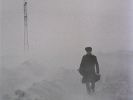Eye For Film >> Movies >> The Second Circle (1990) Film Review
The aesthetic is cold, the mood austere and the pace glacial in Alexander Sokurov's study of grief. This second circle, although storm-tossed, is not full of Dante's lustful. On the contrary, this is a place where life might well be considered to be a grimmer state than death but where there is still a glow of grief beneath the bureaucracy.
Somewhere in remote Siberia a young man (Pyotr Aleksandrov), returns to his father's dismal little flat. His father is dead and the film charts the son's logistical nightmare as he tries to bury him. Every aspect is a challenge, from acquiring a death certificate to washing the body in the flat which has no running water. Although the film has an absurdist edge, Sokurov isn't looking for humour here but humanity, trapped under layers of form filling and 'ceremony' that has no soul.

It is telling that the father's cause of death is listed as 'cancer', with Sokurov suggesting that the state itself is riddled with a similar silently encroaching disease that is eating away at society and community. Though verbal exchanges are few and far between, when they come, they are steeped in irony, such as the suggestion from one civil servant that she "wants to fight bureaucracy" or the assertion that "hardship is ahead but the worst is behind".
Sokurov's palette is so washed out it resembles sepia, and the mood in the flat so chilly that not even the flicker of a fire suggests warmth. In fact, the snowscapes found outside the high-rise look welcoming by comparison. His protagonist is virtually silent throughout, although his one or two exchanges - such as his determination that his father should be buried, not cremated - speak volumes as to the depth of his sorrow.
The contemplative - or to put it more bluntly, exceedingly slow - style of Sokurov and his adversity to traditional narrative are a challenge for the viewer, particularly one not steeped in Russian history. I've certainly found it too much in some of his other films, most notably Alexandra. Here, however, his lingering shadowy close-ups or steady emphasis on the smallness of the protagonist in the face of his challenges carry a weight that rewards those prepared to go the distance.
Reviewed on: 02 Nov 2012
















